INSTITUTE FOR THE HUMANITIES


























I sit down to write just after reading yet another newspaper article about the death of the humanities. Students don’t care about English, history, philosophy, or foreign languages anymore; they are focused on careers and “practical” majors. In the fast-paced world of digital natives, there is little time or interest in reading books, learning languages, or studying the past. Or so the narrative goes.
And yet: over the past year at the Institute for the Humanities, students directed smart and engaged questions to poet and activist Alexis Pauline Gumbs, asking about her writing practice, her commitments to her various communities, and the way she translates her values into her poetry. They met production designer Hannah Beachler and eagerly explored ideas about race, film narrative, and production design with her; they posed for selfies or group portraits in front of Tatyana Fazlalizadeh’s public murals; and they embraced digital scholar Moya Bailey as a model of engaged humanities research. Our public humanities interns energetically pursued ways of making humanities research broadly accessible and available through podcasts, a newsletter for undergraduates, and guided visits to our gallery.
I’m happy to report that our experience at the institute counters the all-too-frequent predictions of the death of the humanities. To be sure, enrollments in humanities majors have dropped at U-M in the last decade, but students still take humanities classes and they still come to listen to and dialogue with scholars and artists about poetry, fiction, films, history, images, and above all ideas. We don’t find that students have lost interest in thinking about literature, philosophy, history, and the arts. Instead, they bring digital competencies, interdisciplinary
connections, and a sharp sense of the world we live in to the study of the humanities as well as to their participation in events organized by the Institute for the Humanities. Your support for such events is crucial, and for that, you have my profound gratitude.

With very best wishes,
Peggy McCracken, director Mary Fair Croushore Professor of the Humanities Marc and Constance Jacobson LectureModern Languages Building mural by Tatyana Fazlalizadeh.

When artist and activist Tatyana Fazlalizadeh thinks about social justice issues, she thinks about how she can make a difference and change the culture through her art. During September 2022, she spent several weeks meeting with Black and brown, queer, and women-identified students on campus. She wanted to understand the ways that they experience race and gender on campus and explore how students are treated based on their identities. The engagements culminated in a public art installation on some of U-M’s most iconic buildings, using Fazlalizadeh’s drawings of the students to present their experiences and stories back to the public.
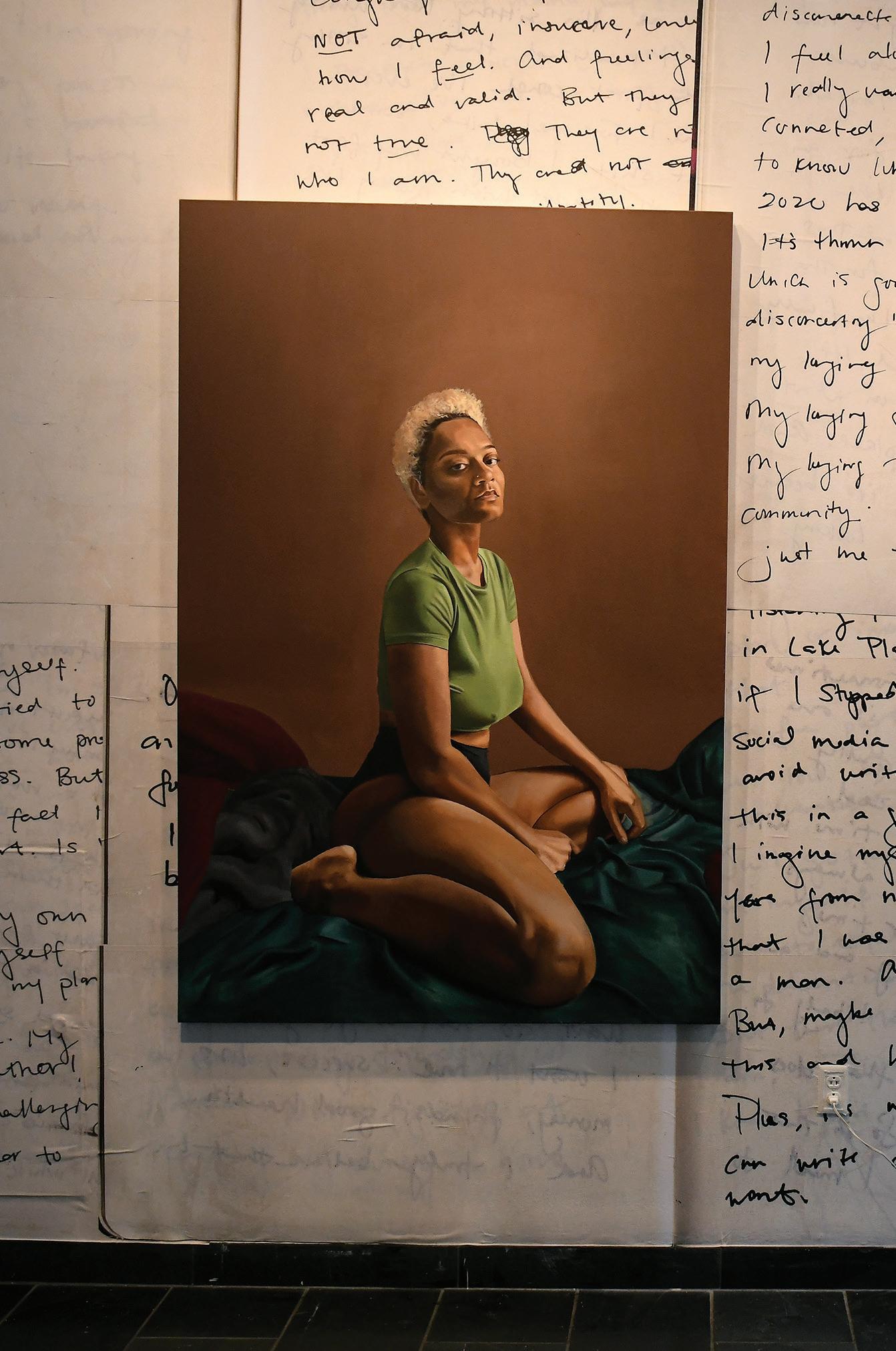
“My process of working and the process for creating this project begins with engagement from the student body,” Fazlalizadeh explained. Through workshops and interviews, she spoke with students, holding candid and honest conversations about their lives and how they have experienced racism, sexism, and other forms of oppression.
“Fazlalizadeh’s work is very much about the students being heard and occupying institutional spaces,” added Amanda Krugliak, curator at the Institute for the Humanities Gallery. “It isn’t static. The project had built into it space for discourse, for dissent, for constructive critique, and future visions. It challenged archaic ideas as to who we should honor in public spaces with monuments or buildings. It publicly presented the thoughts and voices of people whose voices have historically been overlooked.”
Four oversized murals were installed on campus, on the Modern Languages Building, Shapiro Undergraduate Library, and the Trotter Multicultural Center. There were also several cutouts of lifesize drawings posted on the ground on central campus. “Each cutout and each installation on each building had the potential to be resonant in a different way and change the very landscape on campus and the way we see things,” said Krugliak.

LSA senior Amelia Popowics, vice chair of the LSA Student Government Sexual Misconduct Response and Prevention Task Force, said she believed the public presentation of this project would force people to talk about racism, sexism, and sexual misconduct at the University.
“Her choice of a public mural kind of medium for this project is really smart for the college student demographic,” Popowics said in an Oct. 6, 2023, Michigan Daily article. “We’re not as likely to go into an art gallery and take the time to do that, but when something is on the street right where you’re passing by, you’re confronted with the subject matter, even if you’re not seeking it out yourself.”
In addition to the public mural component, Fazlalizadeh had an exhibition at the Institute for the Humanities Gallery. In Pressed Against My Own Glass, a multimedia installation on Black womanhood within the home space, Fazlalizadeh explored her childhood and adulthood within the domestic space and how it connects to the experiences of other Black women and those who had a girlhood. Using paintings, drawings, video, and reappropriated home objects, she examined her experiences of joy, rest, sadness, and fellowship in the home. While doing so, she made connections to her Black women peers, even those like Breonna Taylor and Atatiana Jefferson who show how racist violence is a threat to Black women even in their homes.
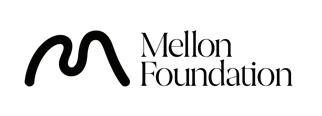
[TATYANA FAZLALIZADEH’S PUBLIC MURAL PROJECT] KIND OF FORCED YOU TO STOP. IT FORCED YOU TO THINK ABOUT THE MESSAGES … THIS ART IS NOT GOING TO BE THERE FOREVER, BUT IT WILL MAKE YOU THINK ABOUT SOMETHING AND THEN IT WILL CHANGE YOU IN THE PROCESS.”–Amal Hassan Fadlalla, professor of Afroamerican
and African studiesShapiro Undergraduate Library mural by Tatyana Fazlalizadeh.
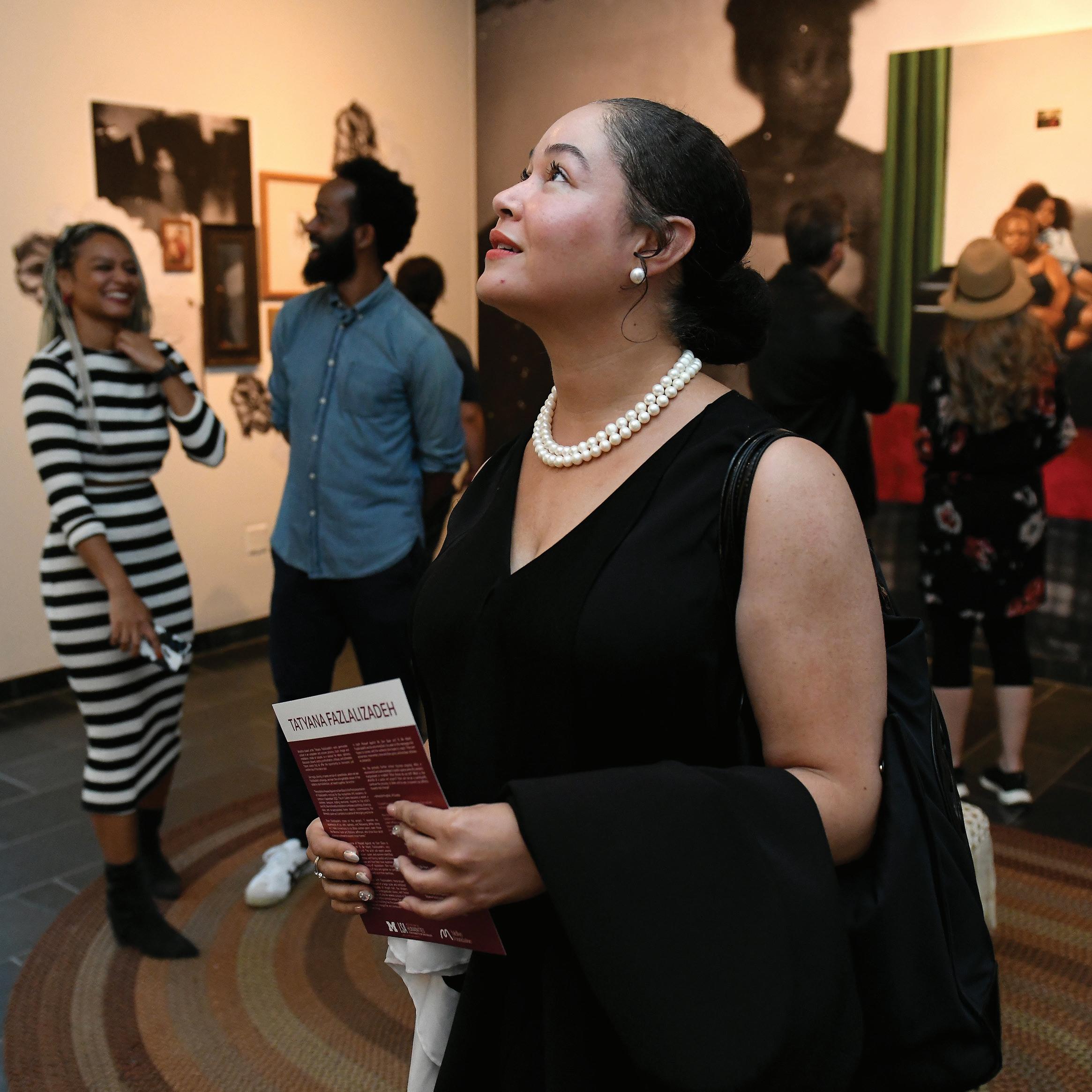 To Be Heard opening reception.
To Be Heard opening reception.

Afrofutures was a month-long series of events that brought together scholars, artists, and activists to reexamine the past, explore critical issues in the present, and create a space for imagining possible futures.
 Angela Dillard, Aaron Coleman, and Kirstie Dotson; Future of Black Studies Faculty Panel.
Artwork by John Jennings.
Angela Dillard, Aaron Coleman, and Kirstie Dotson; Future of Black Studies Faculty Panel.
Artwork by John Jennings.
2023 MARC AND CONSTANCE JACOBSON LECTURE
POETRY AS PRAXIS: ALEXIS PAULINE GUMBS IN CONVERSATION

WITH MADHUMITA LAHIRI
Alexis Pauline Gumbs is an American writer, independent scholar, poet, activist, educator, and “queer Black troublemaker and Black feminist love evangelist.” Her books include Undrowned: Black Feminist Lessons from Marine Mammals and Spill: Scenes of Black Feminist Fugitivity. She talked about the many aspects of her work in conversation with Madhumita Lahiri (U-M associate professor, English language and literature).
THE FUTURE OF BLACK STUDIES: U-M FACULTY PANEL
A conversation with U-M faculty about the possible future directions for Black studies in the university and beyond. Panelists include Aaron Coleman (postdoctoral fellow, comparative literature), Matthew Countryman (associate professor, history and Afroamerican and African studies), Kristie Dotson (professor, philosophy and Afroamerican and African studies), Kira Thurman (associate professor, music, German, and history), and Jessica Kenyatta Walker (assistant professor, Afroamerican and African studies and American culture). Moderated by Angela Dillard (professor, Afroamerican and African studies, Residential College, and history).
THANKS TO MITCHELL SCHOLARS AND HUMANITIES AFROFUTURES, I HAD THE PLEASURE OF SPEAKING WITH AND LISTENING TO HANNAH BEACHLER. THIS EVENT WAS REALLY INSPIRING. I HAVEN'T MET MANY BLACK HEROES IN THE FILM INDUSTRY. AS AN UP-AND-COMING BLACK GIRL IN THE FILM AND TELEVISION INDUSTRY, I UNDERSTAND THE IMPORTANCE OF A SUPPORT SYSTEM.”
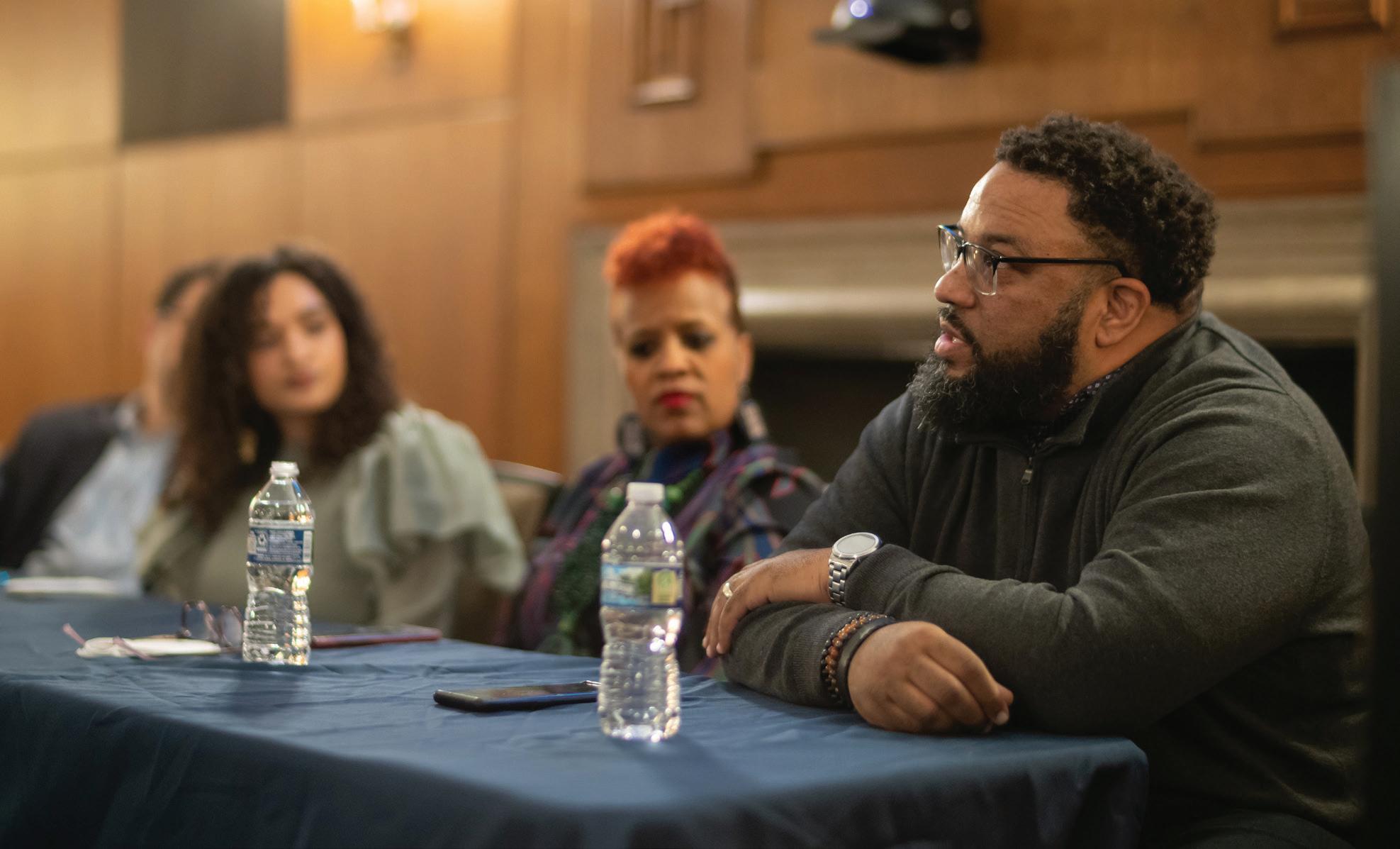
This event brought together local activists and thinkers whose work intersects in various ways with the humanities to talk about the multi-faceted activist and creative work being undertaken in southeast Michigan. Panelists: Yodit Mesfin Johnson (president and CEO, NEW Ann Arbor), Rod Wallace (educational programs coordinator, Grove Studios, Ypsilanti), and Liz Kennedy (program manager, Allied Media Projects). Moderated by Matthew Countryman (U-M associate professor, history and Afroamerican and African studies).
In this Afrofuturistic twist on a classic game, attendees created their own bingo boards, replacing traditional bingo card numbers with images from Afrofuturist art and comics. Winners were awarded prizes from local African-American-owned businesses. Presented by the Public Humanities Interns.
–Class of ‘24 FMTV studentLiz Kennedy, Yodit Mesfin Johnson, and Rod Wallace; Local Afrofutures: Communities and Connection.
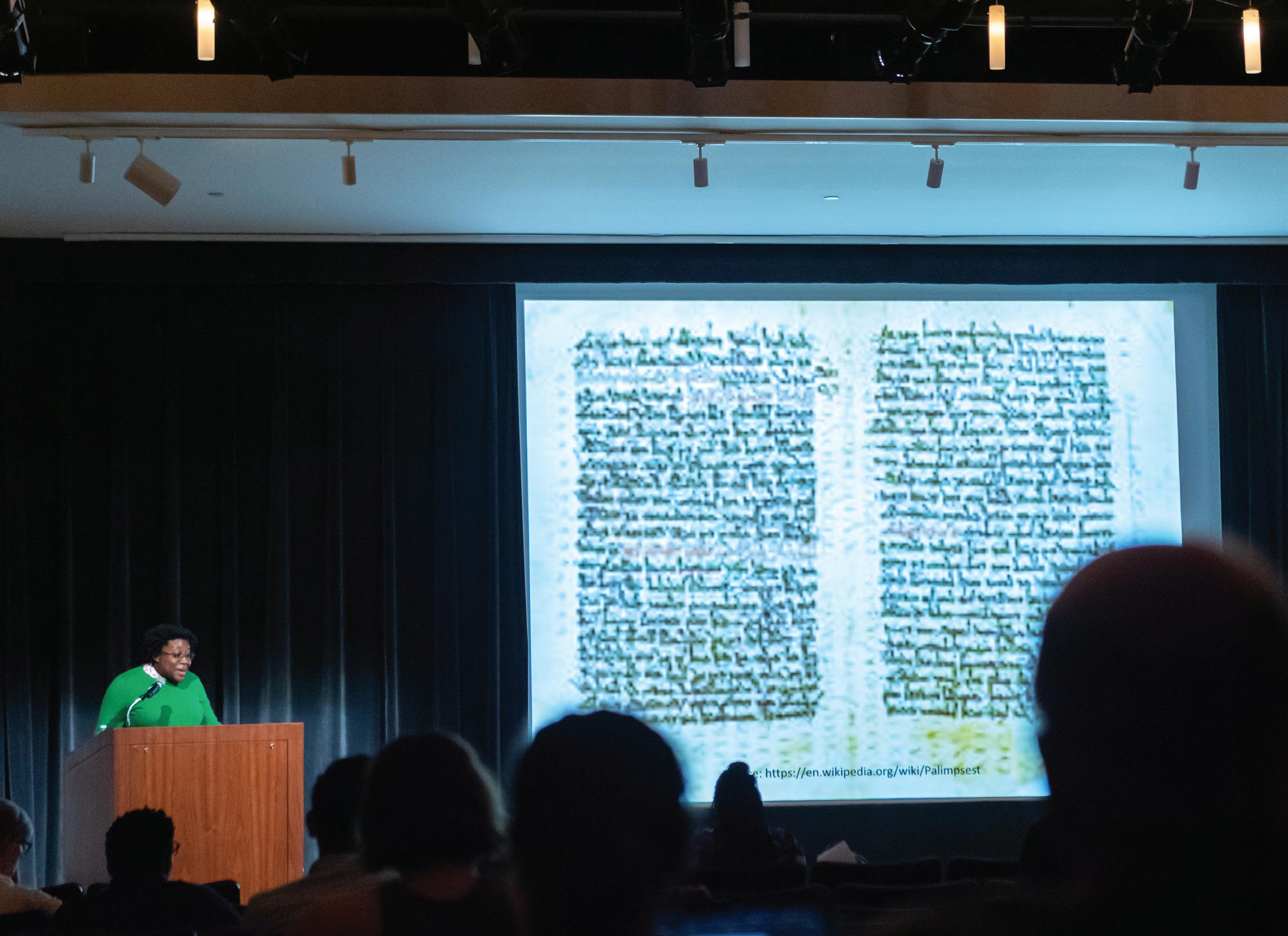
“BLACK MIRROR AND BLACK FEMINIST FUTURES OR LETICIA WRIGHT’S WRONGS?” BY MOYA BAILEY
Moya Bailey is an associate professor at Northwestern University and is the founder of the Digital Apothecary and co-founder of the Black Feminist Health Science Studies Collective. This talk looked back at the “Black Museum” episode of the popular sci-fi series Black Mirror to ask: is this a Black feminist text and does it make a difference if the actor in the role is not a feminist? Examining the filmography of Leticia Wright in contrast with her conservative Christian views, this talk endeavored to think through the messiness of the feminist potential of performance even in spite of oneself. Moderated by Apryl Williams (U-M assistant professor, communication and media and the Digital Studies Institute).
Neptune Frost is an Afrofuturist punk musical that debuted at the 2021 Cannes Film Festival to critical acclaim. Set between states of being –past and present, dream and waking life, colonized and free, male and female – Neptune Frost is a call to reclaim technology for progressive political ends. Presented by the Public Humanities Interns.
40 songs on the Humanities Afrofutures Spotify playlist

WONDERING WAKANDA: HANNAH BEACHLER IN CONVERSATION WITH SCOTT POULSON-BRYANT
Hannah Beachler is an American production designer whose work includes Black Panther, Black Panther: Wakanda Forever, Moonlight, and Beyonce’s visual album Lemonade, among others. She discussed her life and work with Scott Poulson-Bryant (U-M assistant professor, Afroamerican and African studies).
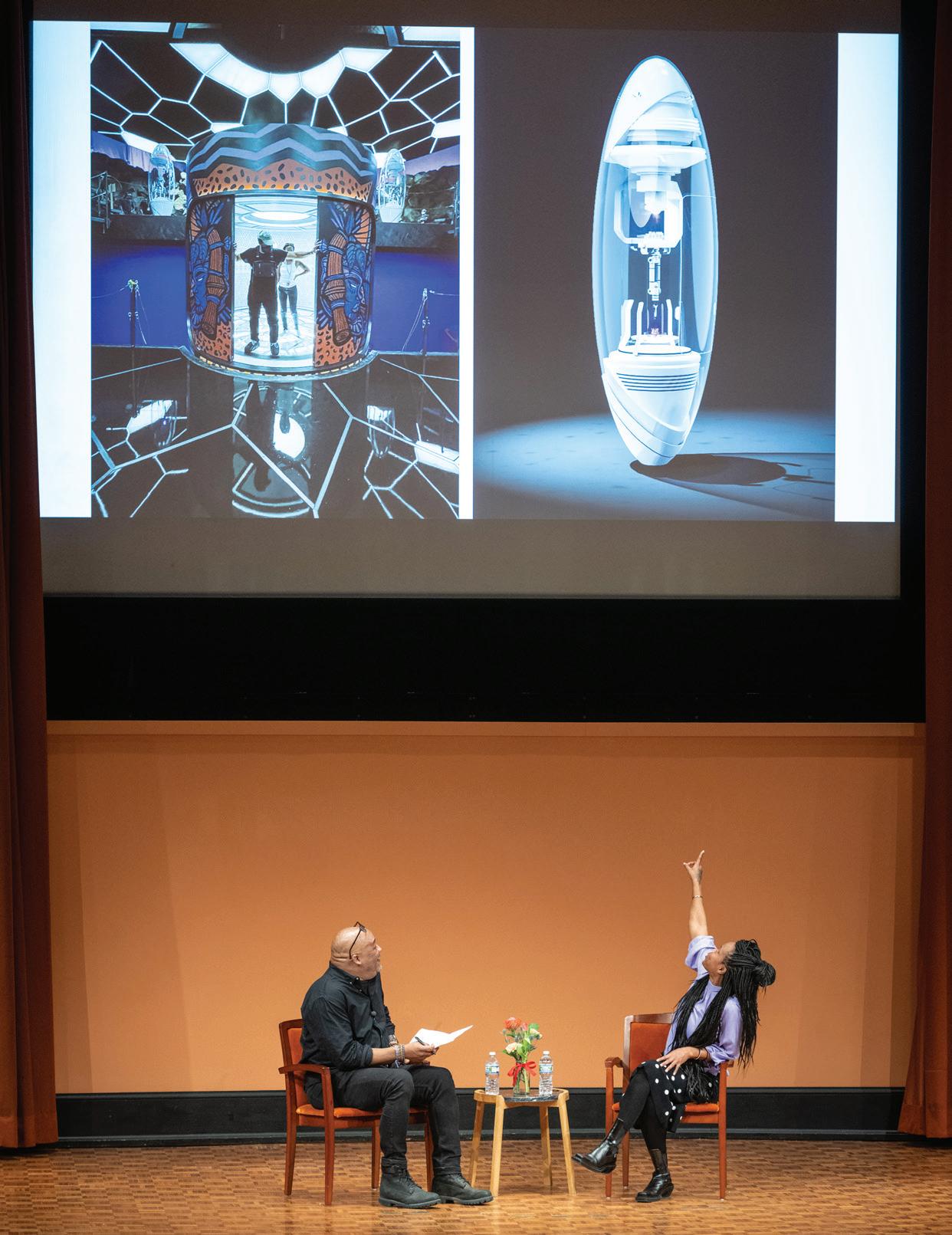
“Reimagining Black Life in Wakanda,” Stateside on WUOM, myumi.ch/x7zX9
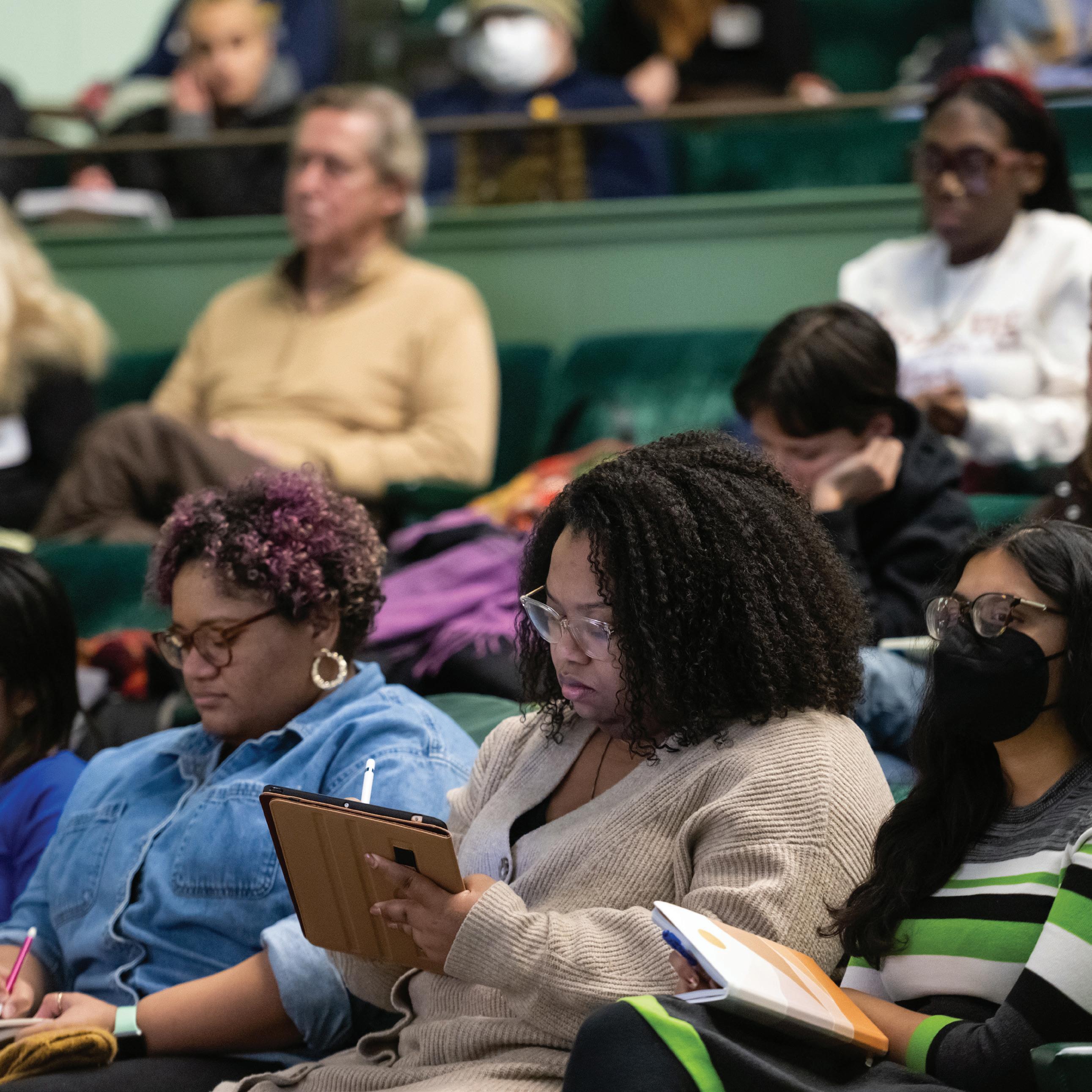 Marc and Constance Jacobson Lecture, "Poetry as Praxis: Alexis Pauline Gumbs in Conversation with Madhumita Lahiri.
Marc and Constance Jacobson Lecture, "Poetry as Praxis: Alexis Pauline Gumbs in Conversation with Madhumita Lahiri.

How many humanists does it take to screw in a lightbulb? Oftentimes, just one will do the trick: writing in the quiet of your office, the lightbulb will pop on in your brain and the inspiration finds its way from head to hand to page. But sometimes, for some lightbulbs, you need a roomful of us, a dozen or more throwing windows open onto one another’s projects; sometimes you need a lunch or a coffee break with three or four of us to trade ideas, to pull them taut and stretch them in new directions; sometimes, you need others to help you screw that lightbulb in. And when it does come on, it will be brighter, sharper, reaching farther.
This is what the Institute offered me this year. On the one hand, a respite from the demands of teaching and service, a headspace uncluttered to focus on pushing my book project over the finish line; on the other hand, a vibrant collective to cross wires and to build connections. More than workshopping my own ideas, in fact, I think that the greatest boon was simply peeking in on other people’s fascinating work. How can the crudest of ancient Egyptian jokes help us dismantle civilizational narratives today? What are the afterlives of racial passing narratives in the twenty-first-century U.S.? How did Octavia Butler make sense of the Reagan years? Oftentimes, these kinds of questions were simply a feast of ideas for their own sake, but some occasioned real cross-pollination and dialogue, opportunities for revisiting my own work in the new light shed by others’ projects.
As I pack my boxes and return to my home departments, I look back on a year of generous thinking, of new friendships and new directions and I feel invigorated for the coming fall and years ahead. And I am particularly grateful to the staff whose intellectual and physical labor, day in and day out, has built and sustained the Institute and its creative energy.
HUNTING FAMILY FACULTY FELLOW
AMERICAN CULTURE, “Citing Amina: Everyday Knowledge, Blackness and the Archive"

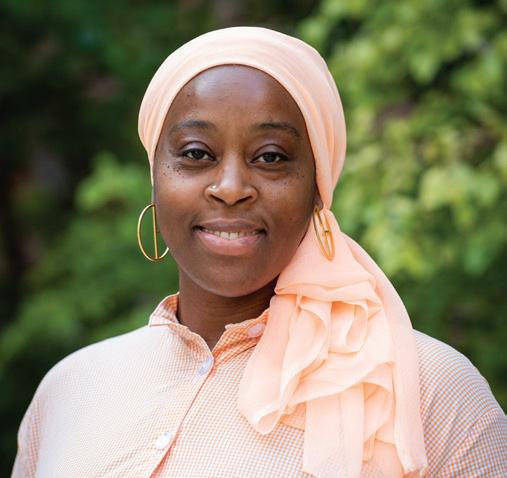
HELMUT F. STERN FACULTY FELLOW
ENGLISH LANGUAGE AND LITERATURE
“Governments of the Tongue: A Literary History of Human Rights"
RICHARD AND LILLIAN IVES FACULTY FELLOW; FILM, TELEVISION, AND MEDIA, “Networked Bollywood: Star Switching Power and the Globalization of Indian Cinema”



JOHN RICH FACULTY FELLOW
ROMANCE LANGUAGES AND LITERATURES, “New World Italians: The Invention of a Brazilian Identity”
JOHN RICH FACULTY FELLOW
HISTORY, U-M DEARBORN, “Halal Metropolis: Mosques, Markets, and Muslim Visibility in Greater Detroit”
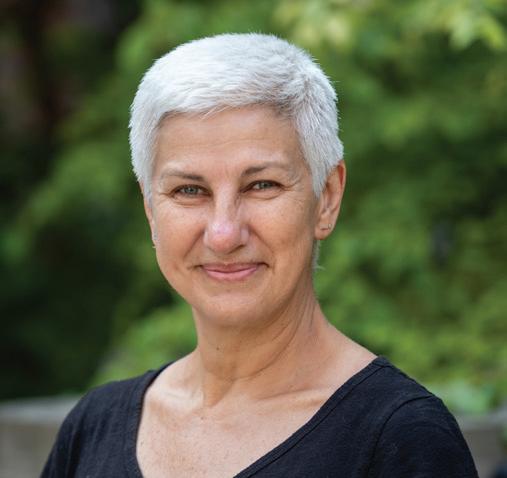

HUNTING FAMILY FACULTY FELLOW
ENGLISH LANGUAGE AND LITERATURE
“Race Traitors: “Bad” Objects and Illicit Attachments in African American Literature”
HELMUT F. STERN FACULTY FELLOW; CLASSICAL STUDIES AND COMPARATIVE LITERATURE
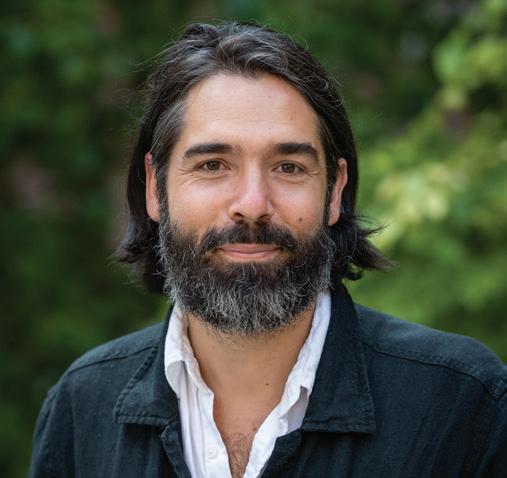
“Greece and Turkey’s Undocumented Literatures at the East-West Borderscape"
STEELCASE FACULTY FELLOW
ARCHITECTURE, “Arabo-Islamic Humanities in Tenth-Century Iraq: Expressive Culture and Nonviolent Resistance”
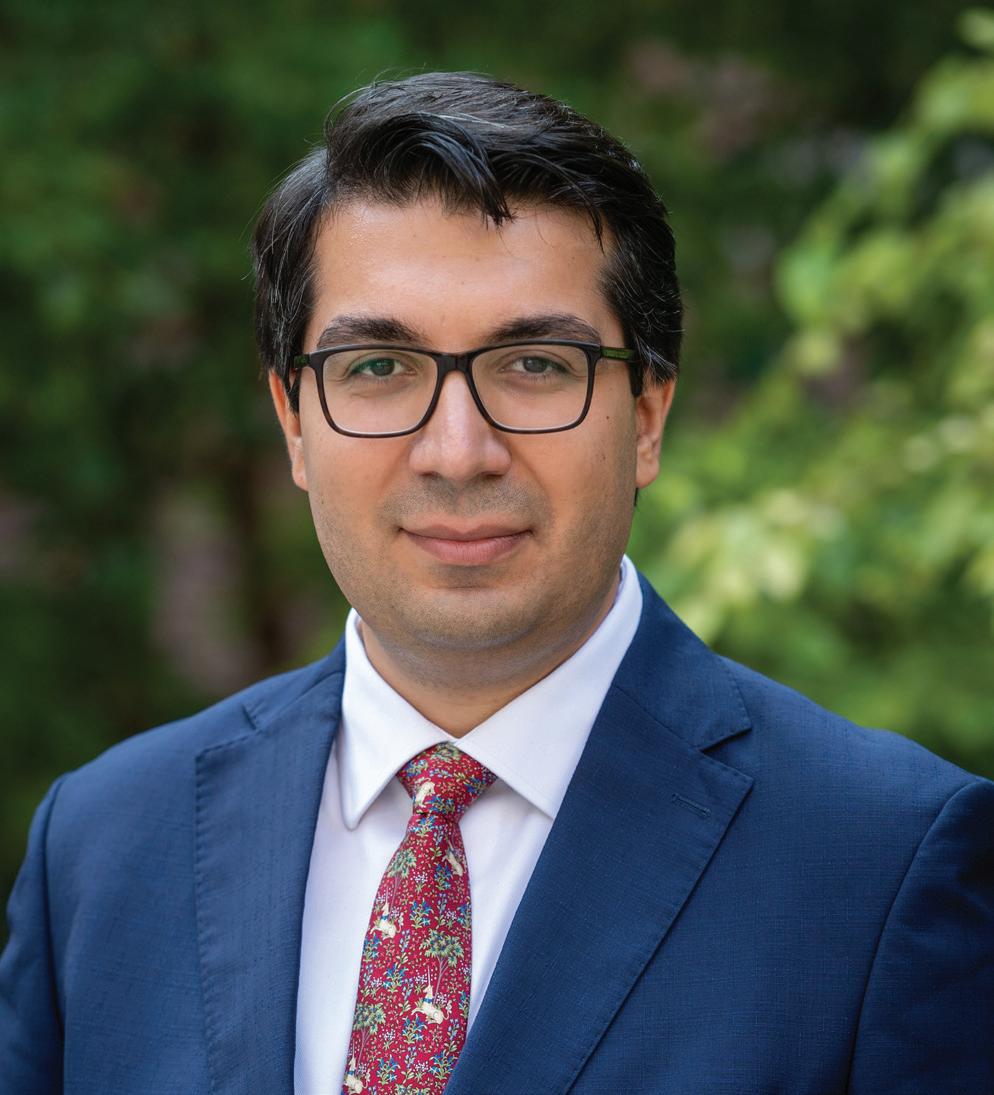
I came to the institute with a project on Mediterranean contacts. The institute itself transformed the way in which I see my project with unexpected connections, surprising insights, and serendipitous discoveries coming from the members of the community. First and foremost, my fellowship gave me a great chance to satisfy my voracious appetite for the humanities with immersion in the discussions at the intersection of history, literature, languages, social sciences, and arts.
Our weekly seminars and biweekly public lectures did not only motivate me to conceive my own work in a more integrative fashion, appealing to the broader public of humanistic disciplines, but also inspired me in the most unexpected ways. There were overlaps in terms of languages, geography, and periods between my work and some of the other fellows’ projects. However, the projects of fellows from seemingly disparate fields also gave me the inspiration for new approaches. To give you an idea, while reading the chapters and listening to the lectures by the fellows doing American literature or modern architecture, many new thoughts about the premodern Mediterranean occurred to me. Such experiences and “epiphanies” were the most transformative and precious parts of my fellowship year.
During this last year, I completed a lengthy portion of my dissertation and an article draft. In addition to our weekly seminars, I benefited from many fellows through daily conversations and informal meetings. Their sharp criticisms, fresh questions, and insightful suggestions strengthened the interdisciplinary character of both pieces. We have built friendships which, I am confident, will make way for various collaborative projects in the future.
Looking back, feeling a bit wistful, I can wholeheartedly say this was a year to remember!
IN ESSENCE, OUR COMMUNITY’S PASSION FOR CRITICAL INQUIRY AND REMOVING SCHOLARLY BOUNDARIES HAS PROFOUNDLY CONTRIBUTED TO MY PROFESSIONAL AND INTELLECTUAL DEVELOPMENT.”
“Samet Budak is a PhD student in Middle East Studies
DAVID AND MARY HUNTING GRADUATE FELLOW; MIDDLE EAST STUDIES, “The Lost Tribe of Plato: The Druze Religion and Isma’ili Neoplatonism"
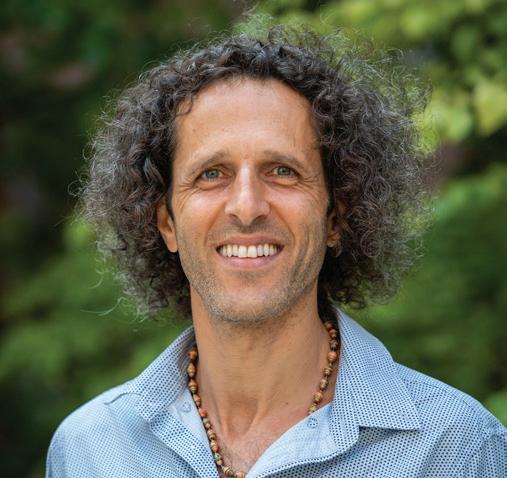
DAVID AND MARY HUNTING GRADUATE FELLOW; CLASSICAL STUDIES, “Ceramics, Craft Communities, and Cultural Interactions in the First Millennium Adriatic: Production and Trade of Apulian Matt-Painted Pottery"

MARY FAIR CROUSHORE GRADUATE FELLOW; HISTORY OF ART, “Civility and Portraits of Women in France (1815–1848)"
JAMES A. WINN GRADUATE FELLOW; ENGLISH LANGUAGE AND LITERATURE
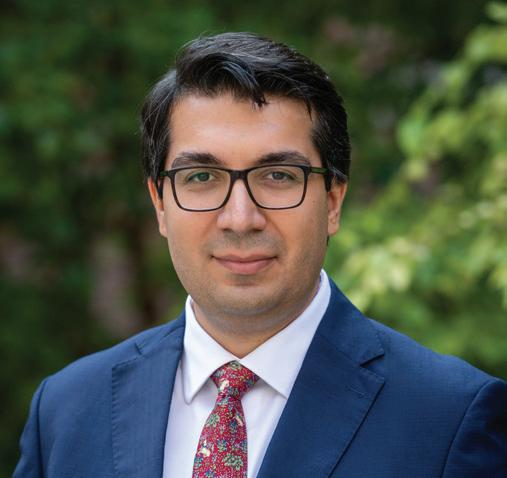

“Standard Deviations: Migration Literature's Overlapping Histories, Images, and Languages”
RICHARD & LILLIAN IVES GRADUATE FELLOW; MIDDLE EAST STUDIES
“A Mediterranean Episteme: Intellectual Networks and Contacts in the Eastern Mediterranean (1350-1500)"
RICHARD & LILLIAN IVES GRADUATE FELLOW; POLITICAL SCIENCE
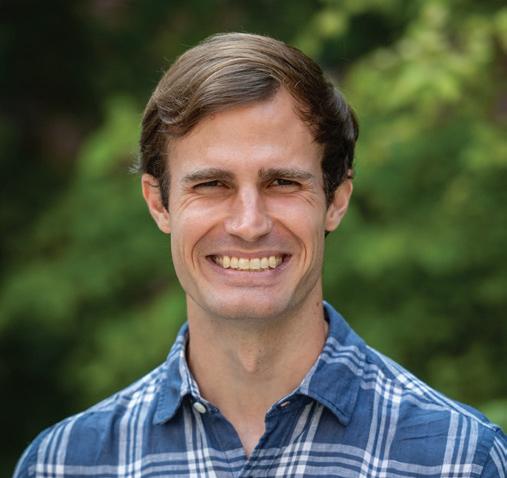
“Towards a Decolonial Account of Desire: The Cultivation of Desire and Indigenous Women’s SelfMaking and Resistance in Early Modern French North America”
MARY FAIR CROUSHORE GRADUATE FELLOW; ROMANCE LANGUAGES AND LITERATURES, “Sharing Flesh: Carnivorism and Commensality in Medieval French Literature”


SYLVIA 'DUFFY' ENGLE GRADUATE FELLOW, CLASSICAL STUDIES
“Greco-Egyptian Humor and Storytelling: Herodotus on the Nile"

Susana Morris took up residence at the institute during winter term 2023 as the Norman Freehling Visiting Professor, her first real-life visit to the institute, though she had been a virtual participant in our panel discussion on Art & Afrofuturism during 2022’s Octavia Butler Week. Morris is an associate professor of literature, media, and communication at the Georgia Institute of Technology, and her research and teaching interests explore Black women’s relationships to Afrofuturism, the Anthropocene, and feminism.
While at the institute, Morris continued her work on Positive Obsession: The Life and Times of Octavia E. Butler, a cultural biography of this important writer. She presented some of this research in a talk titled "The American Project: Legacies of Slavery in Octavia E. Butler’s Kindred.” Morris discussed the role of the American Bicentennial in Kindred — which is set in both 1976 and antebellum America — and in Butler's life and work.
16 fields of study represented by our 2022-23 fellows

SUMMER FACULTY FELLOW
ROMANCE LANGUAGES AND LITERATURES, JUDAIC STUDIES
“Figural Jews and Muslims in Contemporary France”
SUMMER FACULTY FELLOW
ARCHITECTURE; “Marking Time"
SUMMER FACULTY FELLOW
RESIDENTIAL COLLEGE; “The Age of Disillusionment: Palestinian Art After the Intifadas”
SUMMER FACULTY FELLOW
MIDDLE EAST STUDIES; “Authors of Empire: Assyria, Judah, and the Dynamics of Imperial Exchange”
SUMMER FACULTY FELLOW
COMPARATIVE LITERATURE AND MIDDLE EAST STUDIES;“Laying
Claim: Atrocity and Narrative in Lebanon’s Civil Wars”
SUMMER FACULTY FELLOW
GERMANIC LANGUAGES AND LITERATURES; “The Afro-pessimistic Ghost in the Machine in Damir Lukacevic's 2010 film Transfer"
SUMMER FACULTY FELLOW
ENGLISH LANGUAGE AND LITERATURE “Poor Devil”
SUMMER FACULTY FELLOW



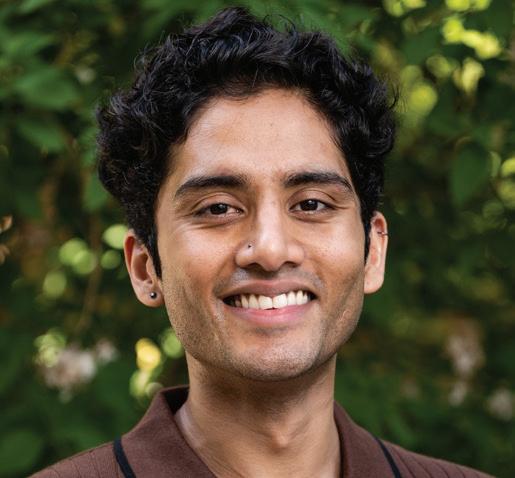

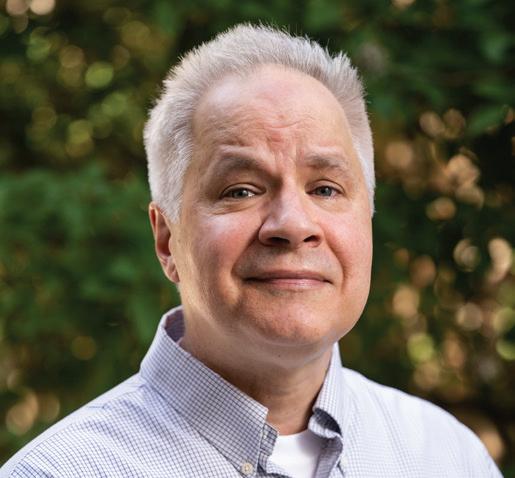
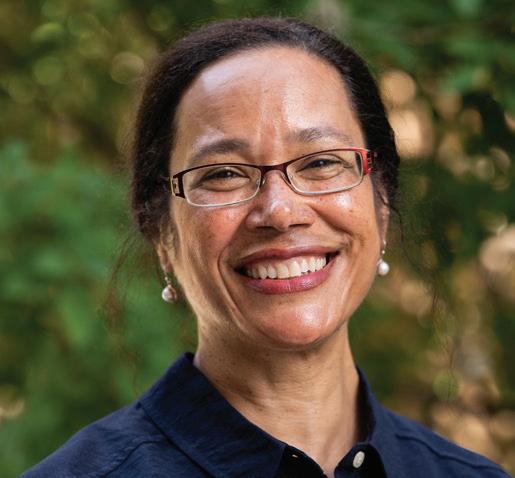
ENGLISH LANGUAGE AND LITERATURE, WOMEN’S AND GENDER STUDIES; “For Insufficiency: Literature, Worlding, and Graphic Arts in Late Modernity”

As a lecturer at the Sweetland Center for Writing, one of my central tasks is to respond to work across genres, disciplines, and modes. In writing workshops, I meet with undergraduate and graduate students and engage in conversations with these emerging scholars to prompt new approaches to their writing.
As a summer fellow, I doubled down on my workshop skills as I provided feedback for experts in fields far flung from my own. This experience was invaluable because it challenged my rhetorical facility to generously critique. It was invaluable because I received such generative feedback.
For the institute, I shared vignettes from a circuitous story titled “Hedge Witch” about a contemporary young woman teasing out the definitions of “magic” and using plant identification apps to supplement her botanical knowledge. With this story, I returned to my creative writing roots to explore questions of ritual and privilege and to experiment with mixing genres and fostering a narrator voice that curses a blue streak.
THE OTHER FELLOWS WERE THOSE MAGICAL READERS WHO SEE MORE IN MY WRITING THAN I DID MYSELF SO THAT I COULD TEST IDEAS, UNEARTH BIASES, AND (IDEALLY) DEVELOP MORE COMPLEX CHARACTERS AND NARRATIVE LANDSCAPES.”
After the fellowship ended, a few of the fellows continued to commune over food and writing, whether around a dining table, a campfire, or via Zoom. What a pleasure it has been to participate, even peripherally, in the unfolding of brilliant projects by brilliant people.
Though “Hedge Witch” remains on her circuitous journey, the Summer Fellowship offered me a feedback loop that continues to sustain me creatively, intellectually, socially, and professionally, an amalgam of which is a certain type of magic.
April Conway is lecturer III, Sweetland Writing Center

SUMMER FACULTY FELLOW
ASIAN LANGUAGES AND CULTURES
“Wartime Japan: Translations of Empire”
SUMMER FACULTY FELLOW
GERMANIC LANGUAGES AND LITERATURE; “Visualizing
Translation: Belonging Beyond Citizenship in Contemporary Germany”

SUMMER FACULTY FELLOW
DANCE; “Dance We Must: Choreographies of Time, Space, and Emergent Matter(s)”
SUMMER FACULTY FELLOW
SWEETLAND WRITING CENTER “Hedge Witch”
SUMMER FACULTY FELLOW
MIDDLE EAST STUDIES; “Sumerian: The Language of the Gods”
SUMMER FACULTY FELLOW
GERMANIC LANGUAGES AND LITERATURES; “Rough Surfaces, Difficult Climates: Ecological Thinking in the Neo-Avantgarde”
SUMMER FACULTY FELLOW




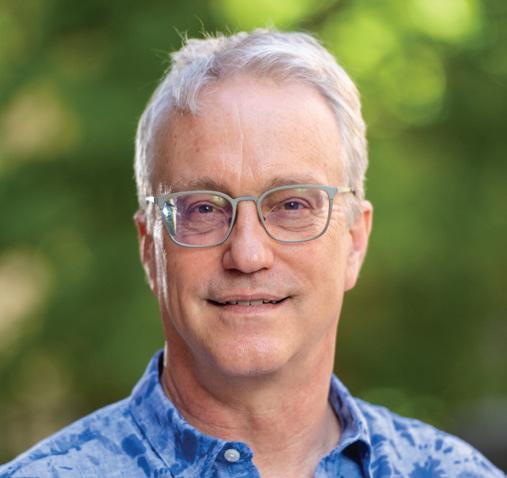

ANTHROPOLOGY; “Slavery, Writing, and Indigenous Jurisdiction in Southwest China”

SEMINAR FACILITATOR
HISTORY AND MIDDLE EAST STUDIES
*Due to changes in the dates of the Summer Fellowship, we are listing 2022 and 2023 cohorts in this Annual Report.

In 2022-2023, the Institute for the Humanities Gallery continued its long commitment to social justice through the arts, while at the same time focusing on the value of human connection and engagement through art as critical to undergraduate education in the humanities. The exchanges between visiting artists and our faculty and students deepened our understanding of how scholarship in the humanities might be truly responsive to real-world challenges as well as more personal human needs.
The gallery hosts four to six nationally and internationally recognized artists yearly in short-term residence. The exhibitions highlight the artists’ existing work or debut new site-specific installations created for the space and supported by the gallery as part of this process. Scheduled class visits to the exhibitions bring in dozens of U-M classes as well as high school and college students from outlying communities. Faculty are able to integrate our exhibitions into their syllabi as teaching opportunities to enhance their curriculum. Our Public Humanities Interns engage with the artists as well, planning innovative events meant to foster even greater undergraduate student engagement. Visiting artists also visit classrooms in outlying communities.
This year, over 700 students met with visiting artists and curator Amanda Krugliak. These in-person discussions were prompted by the exhibitions and tailored to the subject of individual classes, which ranged from “Spanish for Heritage Learners” and “Black Lives and Life Writing” to “Gender and Immigration” and “Women of Color Feminist Filmmaking.”
In addition to her work with artists and exhibitions, Krugliak taught introductory classes for undergraduates on “Arts and Humanities as Social Practice.” She also led intensive workshops for graduate students and faculty that explored the potential for exhibition and visual strategies to extend the reach and accessibility of scholarly research.
[RICKY WEAVER’S EXHIBITION] PROVOKED AN HONEST DISCUSSION WITH MY STUDENTS ABOUT A WIDE RANGE OF INTERWOVEN TOPICS: BLACK WOMEN, CARE, REST, TECHNOLOGY, THE DEFINITION OF WORK, ARCHIVES, COMMUNITY, CONNECTION, CHANGE, ANCESTORS, AND EVEN THE UNIVERSITY AS AN INSTITUTION/THE PURPOSE OF GRADING … THIS VISIT WAS THE PERFECT CONCLUSION TO MY CLASS, REMINDING MY STUDENTS TO DO THE WORK— COMMUNITY BUILDING AND SURVIVAL— WHILE RESISTING THEIR LOCATIONS AS WORKERS IN LATE CAPITALISM.”
–Tiffany Ball, lecturer in women’s and gender studies
Salvador Diaz
ABOUT THE EXHIBITION:
La Pelea/The Fight is a 46-foot panoramic oil-on-canvas. At the center of the “picture” and surrounded by a jeering crowd, the viewer becomes literally and conceptually involved as the one who is about to fight and defend themself. But depending on where the viewer is standing in the space, a different perspective can emerge, suggesting that even a public, collective experience is highly subjective. La Pelea/The Fight references demonstrations, injustices, urban public aggressions, lynchings, and perhaps empathy, allowing the viewer access to a new experience of reflection.

ABOUT THE ARTIST:
Born in 1977 in Mexico, Salvador Diaz considers image and information, and how the media and individuals represent stories to a different end. His immersive panoramic
paintings allow for the viewer to be witness, gaining a different perspective or experience depending on the positioning in relation to the work. His work is original, fresh, and contemporary, while at the same time harkening back to the traditions of Mexican muralists like Diego Rivera.
• “Salvador Diaz’s ‘La Pelea’ unveiled at the UMich Institute for the Humanities,” Michigan Daily, myumi.ch/W2E9R
700+ students engaged with our exhibitions
Brooklyn artist and activist Tatyana Fazlalizadeh was on campus exploring race and gender with U-M students through art. The engagements culminated in a public art installation on some of U-M’s most iconic buildings, using Fazlalizadeh’s drawings of the students to present their experiences and stories back to the public. In addition to the public mural component, Fazlalizadeh had an exhibition at the Institute for the Humanities Gallery.
The To Be Heard public mural project utilized community engagement, public art, and social practice to listen to and amplify the voices of marginalized groups, particularly women and non-white students at the University of Michigan. Through class workshops and interviews, Fazlalizadeh engaged with Black and brown, queer, and women-identified
students on the ways that they experience race and gender on campus, exploring how students are treated based on their identities. The engagement culminated in public art installation across campus using drawings and photos to present the experiences and stories from these students back to the public.
In Pressed Against My Own Glass, a multimedia installation on Black womanhood within the home space, Fazlalizadeh explores her childhood and adulthood within the domestic space and how it connects to the experiences of other Black women and those who had a girlhood. Using paintings, drawings, video, and reappropriated home objects, she examines her experiences of joy, rest, sadness, and fellowship in the home. While doing so, she makes connections to her Black women peers, even those like Breonna Taylor and Atatiana Jefferson who show how racist violence is a threat to Black women even in their homes.
Tatyana Fazlalizadeh is a Brooklyn-based street artist and painter from Oklahoma City, born to a Black mother and Iranian father. Her site-specific work is rooted in community engagement and the public sphere and considers how people, particularly women, queer folks, and Black and brown people, experience race and gender within their surrounding environments. She is the creator of Stop Telling Women to Smile, an international street art series that tackles gender-based street harassment.
• “New York Street Artist Spotlights Racial, Gender Experiences of U-M Students on Campus Buildings,” U-M Arts & Culture myumi.ch/gRwGR
• “UMich Hosts Tatyana Fazlalizadeh as Artist-In-Residence, Six Murals Installed Across Campus,” Michigan Daily myumi.ch/rrzVA
• “Tatyana Fazlalizadeh’s Art at the University of Michigan,” Stateside, WUOM myumi.ch/x7zX9
• “How did an artist uplift women on campus? She displayed them where no one could miss them,” The 19th myumi.ch/5Jxdq
• “Street artist installs larger-than-life portraits of women-identified students on University of Michigan’s campus,” All About Ann Arbor myumi.ch/Z3wXj
• “Public murals by Brooklyn-based artist highlight student voices on UM campus,” Mlive, myumi.ch/qGjdm

Camila Magrane
ABOUT THE EXHIBITION:
Traces consists of a series of collages and a collection of Polaroids that are accompanied by animations and video clips seen solely through the use of an augmented reality application (Virtual Mutations).The scenarios presented in the static images act as literal stages for animated narratives. What once was a captured single moment echoes into motion, creating an additional layer as to what will come thereafter. A dialogue between the past and the present is established and the app itself acts as a mediator between these tenses, allowing the observer to have a glimpse of the afterthought, that range from digital collages to Polaroid instant film.
Camila Magrane is a multimedia artist originally from Caracas, Venezuela. Magrane has been pursuing a professional career as a multimedia artist since 2017, working within a variety of mediums, from photography and collage to animation and virtual/augmented
reality. Prior to her career in the arts, Magrane worked as a community organizer and teacher, creating and managing a curriculum for teaching 3rd-6th graders coding skills in public schools in Caracas, Venezuela.
• “New Art Exhibit Brings Images to Life at University of Michigan in Ann Arbor,” Click on Detroit, myumi.ch/637Vr


Nicole Marroquin
ABOUT THE EXHIBITION: With Care, created for the Institute for the Humanities Gallery, presents the documentary photographs of influential Mexicanborn artist, teacher, and friend Diana Solís in visual dialogue with Marroquin’s own creative work which includes ceramic sculptures and printmaking. Solís’s photography reflects over 25 years of transnational Chicana and lesbian organizing primarily in Chicago and Mexico City between 1975 and 1990. With Care captures the energy and endurance derived from Marroquin’s experience recovering this under-recognized collection of photographs and embraces the longtime friendship between these two women artists.
Nicole Marroquin is an interdisciplinary artist, researcher, and teacher educator whose work explores spatial justice and Latinx history. Marroquin works with youth and communities to decenter dominant narratives and to address displacement and erasure. Her current work explores belonging through histories of student rebellions in Chicago Public Schools from 1968 to 1980. Through research and creative practice, she aims to recover and re-present histories of Black and brown youth and women’s leadership in the struggle for justice in Chicago.
• “Preserving an Archive of Chicana and Lesbian History,” Hyperallergic, myumi.ch/kx1Ay

Ricky Weaver
ABOUT THE INSTALLATION:
A way outta no way combined photographs, found objects, and natural elements including soil and water as a way to capture the immortality of spirit and story. The idea for the project was inspired in part by images of Sojourner Truth as well as a number of other documents, publications, and photos related to early Black history from the U-M Bentley Historical Library that Weaver worked with. As part of the artist’s vision for the project, Weaver activated the space on opening night with a collective sensory response facilitated by Ricky Weaver, Viktor Givens, Bryce Detroit, Andrew Wilson, and Efe Bes. Ultimately, over the next five weeks, “a way outta no way” became a living archive, where personal images, scripture, history, found objects, colloquialisms, and sound and handprints left behind became traces of past events and the human experience, transcending the moment.

Ricky Weaver is an image-based artist, theorist, and mother, born in Ypsilanti, MI. Her art and theory are centered around the lexicon generated through Black women’s everyday practices, dark sousveillance, and images as objects that alchemize the archive on a quantum level. She is currently teaching at ArtCenter College of Art and Design in Pasadena, CA as a fellow for the Association of Independent Colleges of Art and Design. Weaver is represented by David Klein Gallery.
This project was possible by a grant from the Mellon Foundation as part of the Institute for the Humanities’ multi-year High Stakes Art initiative.


THANK YOU FOR LETTING OUR CLASS COME TO YOUR BUILDING.
I LEARNED A LOT ABOUT HISPANIC ART AND I APPRECIATED THE EXTENSIVE KNOWLEDGE YOU GUYS SHARED WITH US ABOUT IT. THE EXHIBIT WAS REALLY COOL AND I FELT LIKE I WAS A PART OF IT.”
–Pioneer High School Student
The Institute for the Humanities Gallery is a unique meeting place for the exchange and interchange of ideas. Each exhibition serves as a starting point for collaboration and critical inquiry, bringing to the institute new perspectives that bridge the humanities and the arts. In addition to providing an exhibition venue for artists, the gallery also offers fellowships, providing artists the time and support to create new work while in shortterm residence and to engage with students and faculty on campus.
The institute’s museum-quality gallery has gained national attention for its curated shows each year. Gifts in any amount can help to ensure that our gallery continues a tradition of exhibitions that showcase the synergies between the work of humanities scholars and creative artists. Our exhibitions feature emerging as well as established artists, often with an emphasis on social justice issues.
Fully funding the gallery would ensure not only the future of our exhibition program, but also enable the institute to expand its outreach multiplying sites of curation across campus and in digital environments, and reaching beyond the campus to new audiences. A gift to endow would provide a naming opportunity.

One of the easiest ways to support the humanities is through an outright gift to the Institute for the Humanities. The University of Michigan makes giving such gifts very easy through its secure gift website (https://leadersandbest.umich.edu/find/#!/scu/lsa), search on the term “humanities” and available funds will be listed.
986 artist video views on YouTube
To discuss establishing an endowment or bequest in detail please contact the director, Peggy McCracken at peggymcc@umich.edu or 734.936.3518.
CONTINUE TO ADVOCATE FOR THESE TYPES OF OPPORTUNITIES AND PROGRAMS BECAUSE THIS WAS ONE OF THE MOST FORMATIVE INTERNSHIPS OF MY LIFE AND I WILL BE FOREVER GRATEFUL FOR THE EXPERIENCES I HAD IN THIS SPACE."
– 2022-23 Public Humanities Intern
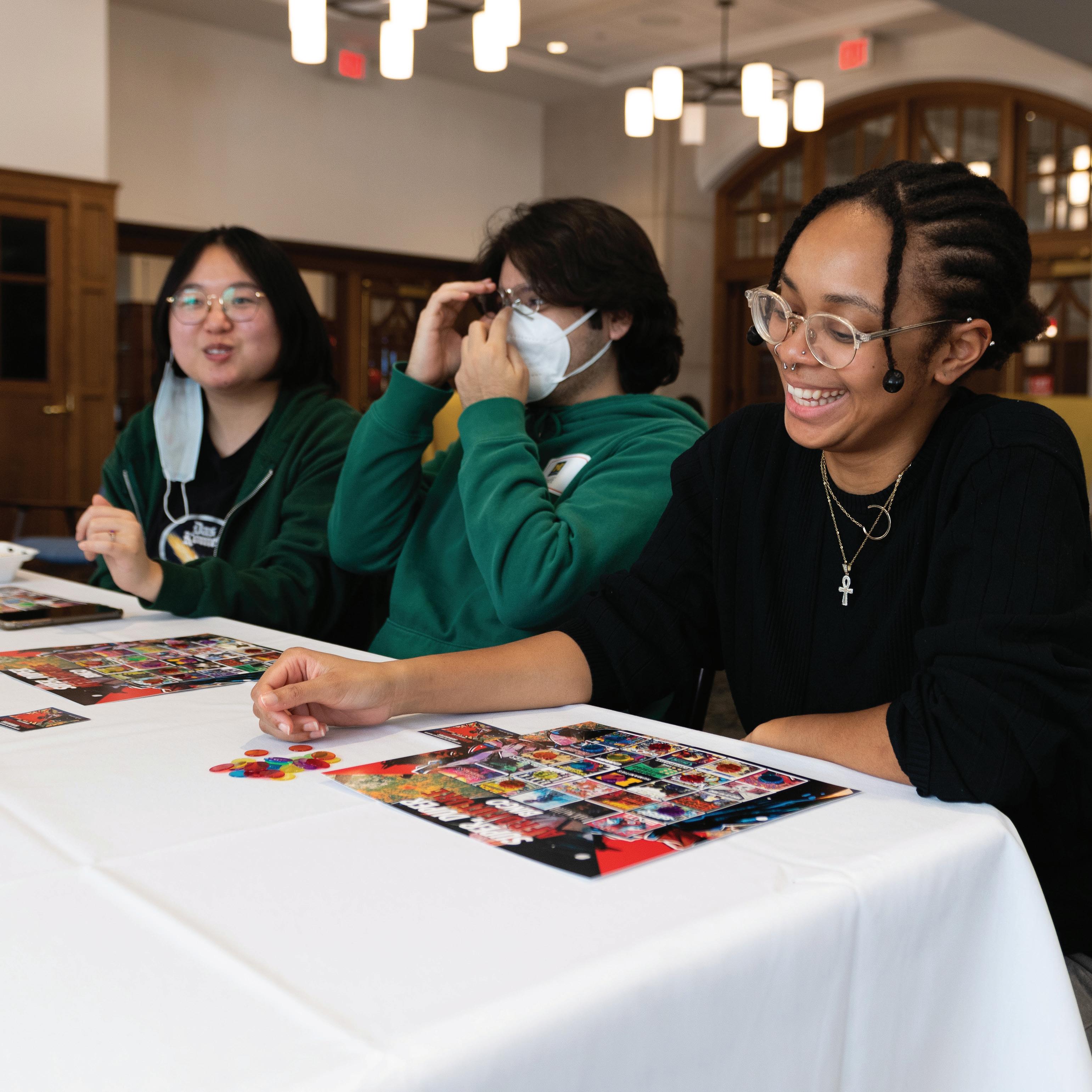
This year’s Public Humanities Interns, our second cohort, brought new ideas, new energy, and new perspectives to the charge of creating projects and events that engage undergraduate students with the humanities. The interns branched out in new directions with an e-newsletter and a new event series centered around our exhibitions. They also built on last year’s successes with another enlightening humanities alumni career panel and a re-vamped podcast. Through their dedication and creativity, and with the support of the Edna Balz Lacy and Hewlett Foundation endowments that enable this initiative, more undergraduate students had the opportunity to learn about and experience the institute and the humanities in general.
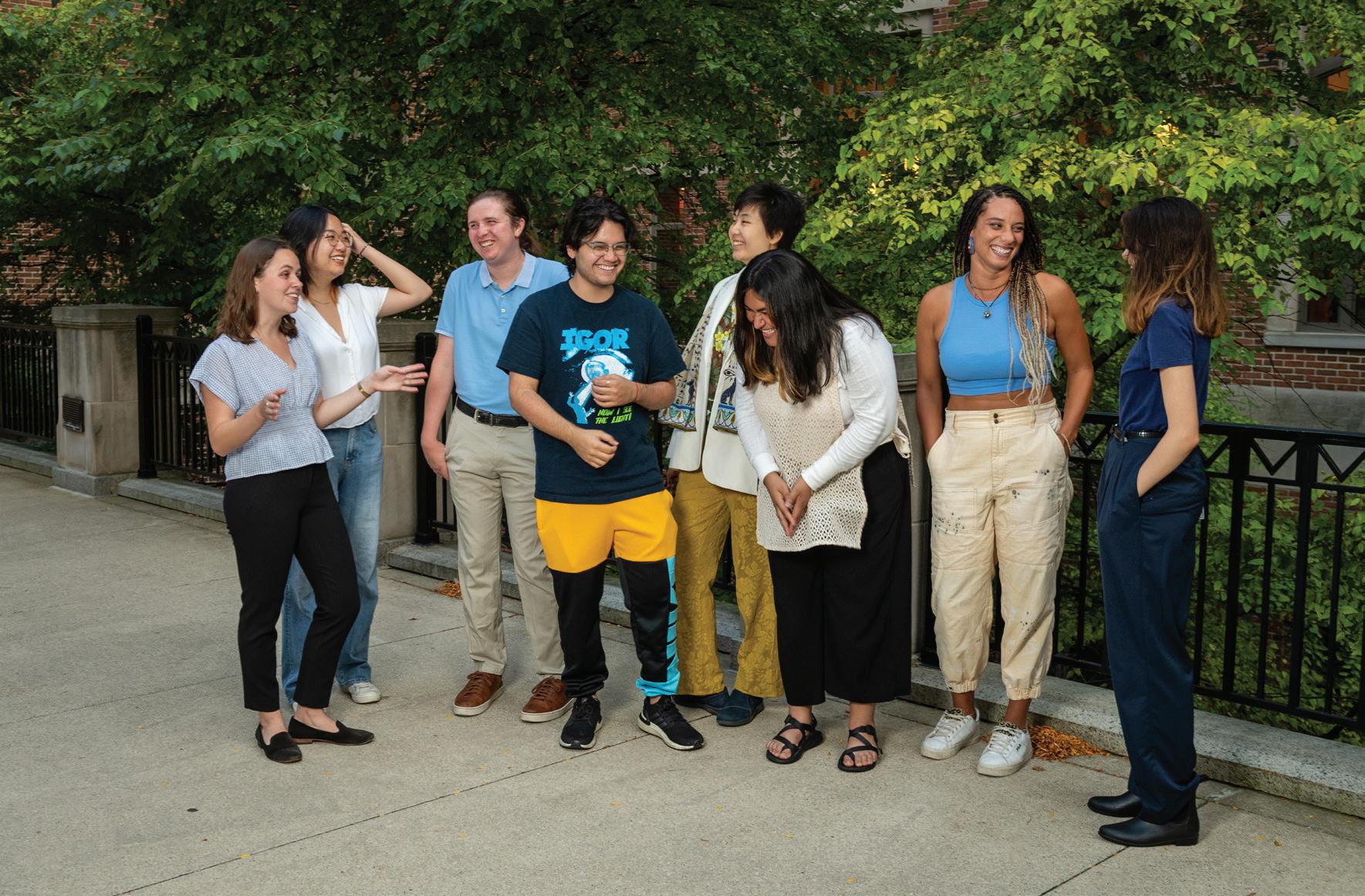
Leads: Lola Yang and Isabel Berg
With a title referencing the ten-minute gap between classes, this podcast featured short interviews with faculty around local humanities topics.

Leads: Piero Guerra and Lauren Ors
Distributed to undergraduate students majoring or minoring in a humanities discipline, this e-newsletter compiled new humanities course info, interviews, humanities-related events, and more.

Leads: Toryanna DeYoung and Yuan Fang
The Don’t Swipe series combined a gallery tour, a hands-on project, and a social component tailored to exhibitions, providing undergraduates with the opportunity to thoughtfully engage with art.
MAJOR: FILM, TELEVISION, AND MEDIA
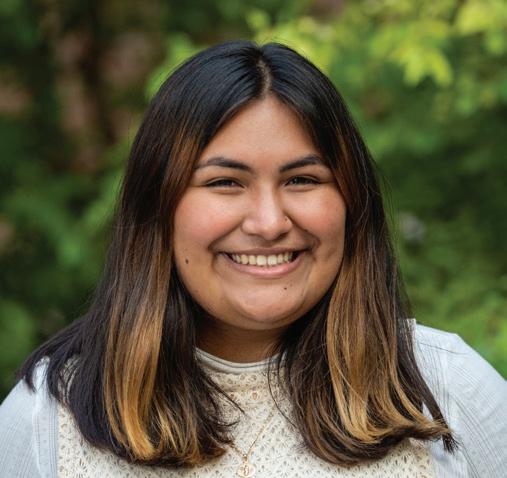



MAJOR: INTERNATIONAL STUDIES
MINOR: ASIAN STUDIES
MAJORS: SOCIOLOGY, ANTHROPOLOGY

MINORS: POLITICAL SCIENCE, AFROAMERICAN AND AFRICAN STUDIES
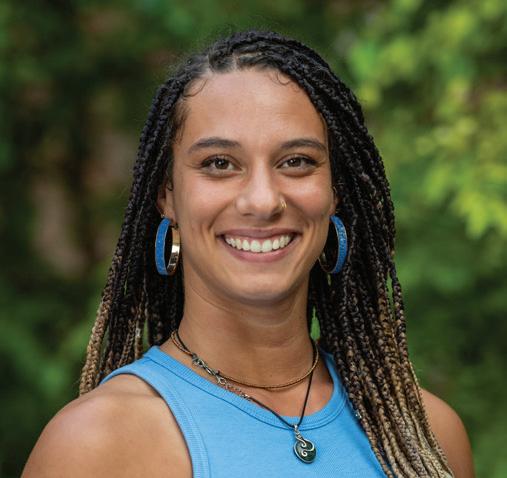
MAJORS: WOMEN’S AND GENDER STUDIES, SOCIOLOGY
MAJOR: BUSINESS ADMINISTRATION
MINORS: HISTORY OF LAW AND POLICY
MAJORS: ENGLISH, ORGANIZATIONAL STUDIES
MINORS: AMERICAN CULTURE, WRITING
YUAN FANG

MAJORS: PHILOSOPHY, CLASSICAL STUDIES
LOLA YANG
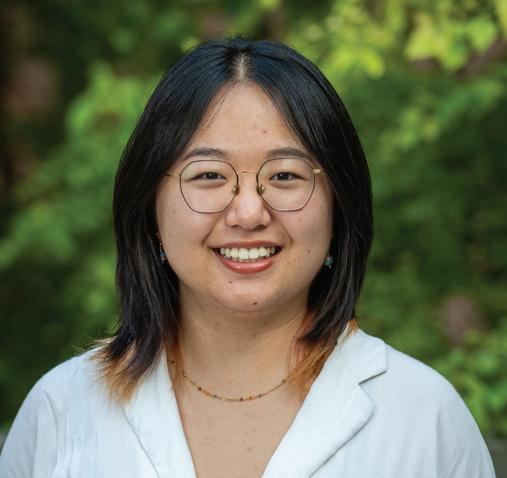
MAJOR: ASIAN STUDIES
MINOR: CREATIVE WRITING
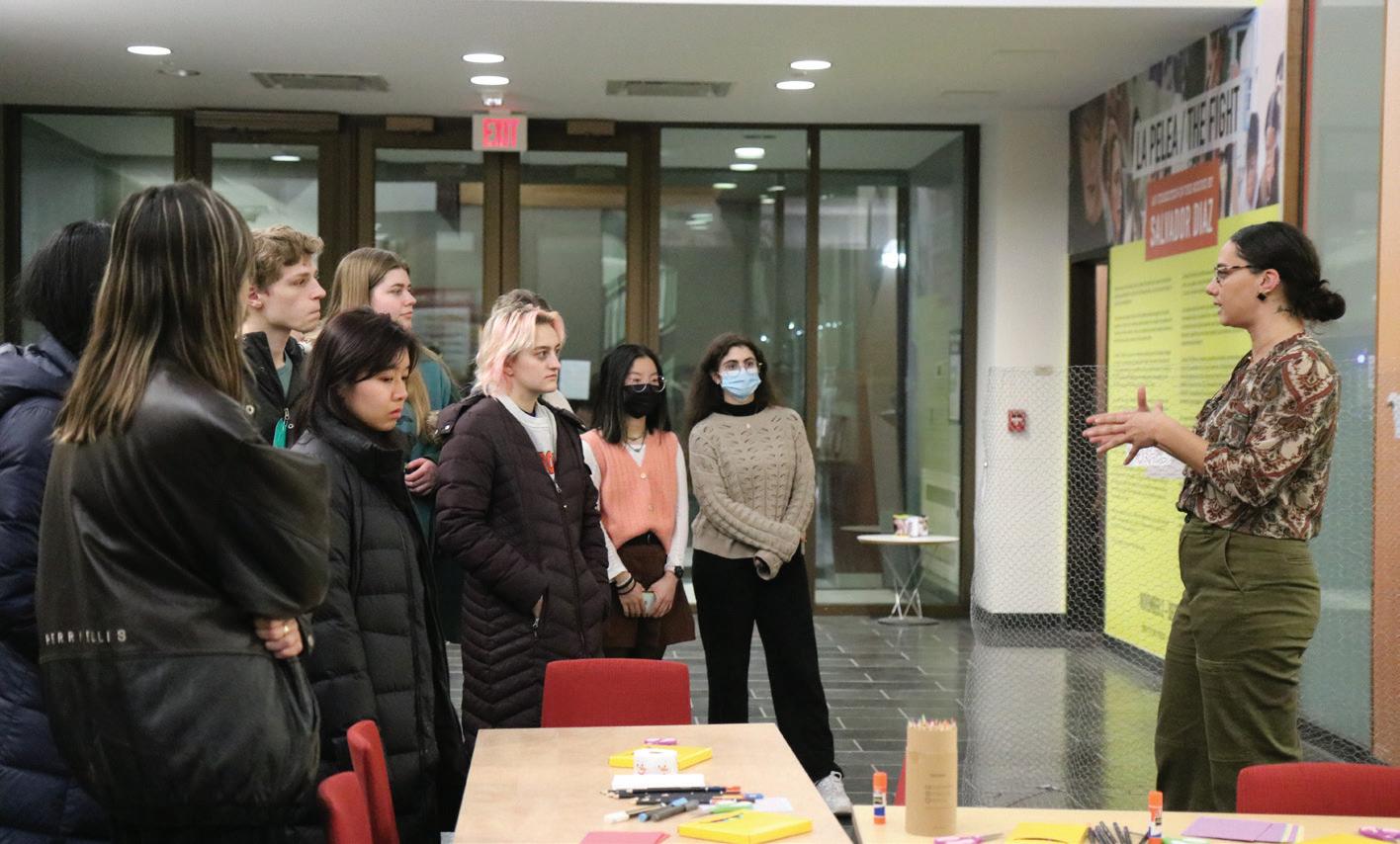
Leads: Thomas Droste and Celia Morones
Two intern-organized projects added to our Humanities Afrofutures lineup. With Super Duper Afrofuture Bingo, students created their own bingo card using images from Afrofuturist art and comics. Neptune Frost movie night brought an an Afrofuturist punk musical to the State Theater.

Leads: Thomas Droste, Piero Guerra, and Lauren Ors
This career panel featured U-M alumni from a wide range of disciplines and careers who are putting their humanities bachelor’s degrees to work. Panelists: Ali Elatrache (BA French and Anthropology; Minor: Urban Studies, 2022), development associate lead at the Michigan Theater Foundation; Kevin Lane (BS Philosophy and English, 2012), founder of Next Step Organizing; Clara Scott (BA Creative Writing and Literature, English, 2021), copywriter at McCann Relationship Marketing; Jacquelyn Timoszyk (BA History and German, 2016), account executive at Google; Dani Williams (BA Afroamerican and African Studies and Film, Television and Media, 2021), project coordinator at the U-M Department of Afroamerican and African Studies.
Read more about the Public Humanities Internship in the Spring 2023 edition of LSA Magazine. myumi.ch/gRwpn
100 Neptune Frost tickets given away
HIGH STAKES CULTURE: HOW DO WE UNDERSTAND ABORTION, CONTROL, AND REPRODUCTIVE JUSTICE
This conversation about choice, power, and justice included a panel discussion followed by Q & A with the audience. Panelists: Lisa Harris (obstetrics and gynecology and American studies PhD), Ava Purkiss (women’s and gender studies and American culture), Ruby Tapia (women’s and gender studies) and SaraEllen Strongman (Afroamerican and African studies) with moderator Angela Dillard (Afroamerican and African studies, Residential College, history).
LAUNCHING YOUR SUMMER: CAREER EXPLORATION STRATEGIES & RESOURCES FOR HUMANITIES GRADUATE
This workshop covered the University Career Center and Rackham’s resources for professional development for graduate students, techniques for exploring career interests outside of academia, advice for networking, and more. Led by University Career Center's Coordinator for Graduate Student Career Advancement Kirsten Elling.
CURATING SCHOLARSHIP: A WORKSHOP ON THE VISUAL PRESENTATION OF RESEARCH
This workshop addressed conceptual questions surrounding visual exhibitions of research, such as visual choices, context, display, and organizational styles. Guest presenters also discussed their experience translating research into an exhibition format. Led by IH Arts Curator Amanda Krugliak.
FUNDING OPPORTUNITIES AT MICHIGAN HUMANITIES
A virtual workshop discussing Michigan Humanities Grants that are available to scholars in the humanities, geared toward faculty who are considering applying for funds through michiganhumanities.org. Led by LSA Associate Dean for the Humanities Gregory Dowd and Michigan Humanities Director of Grants James Nelson.
Presented in collaboration with the National Endowment for the Humanities, this workshop introduced NEH funding opportunities, provided tips for writing a successful application, and provided in-depth information about NEH Fellowships. Led by NEH Senior Program Officer Claudia Kinkela.
This mini-course explored how arts and exhibitions activate research within the humanities, establishing a space for informed and inclusive public engagement. Using the IH Gallery as a springboard, students examined the intent and impact of a wide range of socially driven creative projects. Taught by IH Arts Curator Amanda Krugliak.
Asma Baban, administrative coordinator
Shaunda Bunton, assistant director, public programming and engagement
Stephanie Harrell, assistant director, undergraduate engagement & marketing
Kiera Hollins, social media coordinator
Amanda Krugliak, arts curator & assistant director, arts programming
Peggy McCracken, director
Jacob Napier, gallery coordinator
Karina Pantoja, administrative coordinator
Sheri Sytsema-Geiger, administrative manager
Madison K. Flood, undergraduate curatorial intern
Aileen Das, Classical studies, Middle East studies, Judaic studies, history
Gregory Dowd, ex officio; associate dean, humanities; American culture
Alejandro Herrero-Olaizola, Romance languages and literature
Paul C. Johnson, history, Afroamerican and African studies
Youngju Ryu, Asian languages and cultures
Amy Stillman, American culture, music
Arthur Verhoogt, Classical studies
Jason Young, history
Jordan B. Acker, Southfield
Michael J. Behm, Grand Blanc
Mark J. Bernstein, Ann Arbor
Paul W. Brown, Ann Arbor
Sarah Hubbard, Lansing
Denise Ilitch, Bingham Farms
Santa Ono, ex officio
Ron Weiser, Ann Arbor
Katherine E. White, Ann Arbor
The University of Michigan, as an equal opportunity/ affirmative action employer, complies with all applicable federal and state laws regarding nondiscrimination and affirmative action. The University of Michigan is committed to a policy of equal opportunity for all persons and does not discriminate on the basis of race, color, national origin, age, marital status, sex, sexual orientation, gender identity, gender expression, disability, religion, height, weight, or veteran status in employment, educational programs and activities, and admissions. Inquiries or complaints may be addressed to the Senior Director for Institutional Equity, and Title IX/Section 504/ADA Coordinator, Office of Institutional Equity, 2072 Administrative Services Building, Ann Arbor, Michigan 48109-1432, 734-763-0235, TTY 734-647-1388. For other University of Michigan information call 734-764-1817.
202 S. Thayer Street, Suite 1111 Ann Arbor, MI 48104-1608 734.936.3518
1,385 scans of our event QR codes

Research into the human condition—how we live in the world and how we live with each other—is vital to the cultivation of a just and equitable society. At the institute for the Humanities, we facilitate work that examines humanities traditions broadly across space and time, deepens synergies among the humanities, the arts, and disciplines across the university, and brings the voices of the humanities to public life.
Each year we provide fellowships for Michigan faculty, graduate students, and visiting scholars who work on scholarly and artistic projects. We also offer a wide array of public and scholarly events, including public lectures, workshops, discussions and art exhibitions.
Since 1987, when Arthur Miller read from his memoir Timebends at our inauguration, the Institute has granted fellowships to over 500 Michigan faculty, Michigan graduate students, and visiting faculty and artists.
The Institute for the Humanities:
• Encourages fellows to talk and debate, informally and formally—all in an effort to reach beyond the assumptions of a given discipline
• Promotes innovative teaching in the humanities, encouraging fellows to add perspectives from other disciplines to the courses they teach
• Brings nationally known scholars, artists, and performers to Michigan to participate in programs, conferences, and fellowships
• Offers programs reaching out to university and public audiences. Brings together those who create—artists, musicians, actors, writers—with those who analyze these art forms.
The University of Michigan is located on the territory of the Anishinaabe people. In 1817, the Ojibwe, Odawa, and Bodewadami Nations made the largest single land transfer to the University of Michigan, ceded in the Treaty of Fort Meigs, so that their children could be educated. We acknowledge the history of native displacement that allowed the University of Michigan to be founded. Today we reaffirm contemporary and ancestral Anishinaabek ties to the land and their profound contributions to this institution.